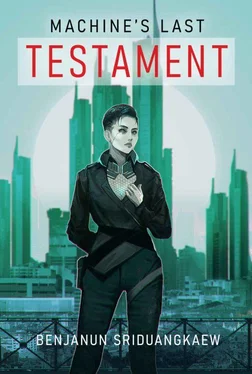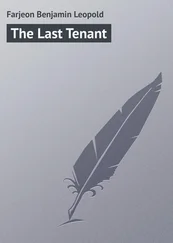She’s deposited. The same camp as before, good for predictability; she already knows how it operates, the temperament of its staff. She is the only arrival today. A couple camp officers come in—she recognizes one, the other must be new—and strip her without ceremony, scoffing when they see the assistive is dry, unstained. They shear off her hair on the spot, a dry fall, dead dark moths on the floor. Her scalp stings, blood trickling from the nicks. The drone sweeps away the hair and the used assistive. An antidote is injected into her to flush out the restraints. Not for her benefit: it is a chance for her to resist and therefore a chance for the officers to respond with bone-shattering force.
She is led, naked, to the showers. It is unnecessary, she is well sanitized and has been inspected at the halfway house, verified that she’s hidden nothing on her person. Nevertheless she is pushed under scalding water, held in place like drowning.
The water stops. She coughs, sputters, on her knees venting as much as she can from her mouth and nose.
One officer chortles, nudges her in the back with one foot. “The champion returns.”
Ovuha says nothing. She gains her feet, keeping her gaze down. Enough that it is not defiant, but not so far down it is meek. There is a delicate balance to strike if she wishes to keep her dignity. Such as it is, within these walls. The smock is tossed at her.
Her assigned dormitory room is shared with five others. They all look up, at once tense, assessing. Who is this person, where will she fit, will she help or hurt, can she be used.
The door shuts, wardens out of earshot. Not in actuality since the dormitory is monitored, but the illusion will do. She does not recognize any of the inmates. Either the rest of her batch have been processed through to freedom—unlikely—or sent off to a different camp on an orbital. One of her roommates is a child, ten or so, huddling with what she assumes is their parent. Young enough not to be separated: the system allows few mercies, but it does allow that. None of these five pose a threat, not physically.
“I’m Ovuha,” she says, settling onto the empty bunk. She hunches slightly, minimizing her height, the broadness of her frame. Crucial to establish, at the outset, that she does not mean to pose a threat to them either. Even her accent she tempers, peeling off the trim of fluency, the fine enunciation. “We could get to know one another a little.”
One laughs at her. The rest ignore her; the child gives her furtive glances, curious despite themselves as to this new factor, this new face in this world of paring down. A cabinet to the far end is their shared storage: she has her own compartment, large enough to fit a smock, small personal effects. It does not open if it detects potential weapons.
They keep to themselves. Ovuha pretends to fall asleep, not that she expects them to be fooled. Still they do talk in low whispers and she sorts through their accents, their languages. They are from all over; the camp doesn’t catalogue them according to regions or cultural common ground. Quite the opposite. She’d used that disparateness to her advantage during her first stay. Easier to drive a wedge.
A screen above the storage shows their schedule. Meals, classes on language and civic duty, blocks of leisure time. Layouts of where to go for communal activities, ablutions, exercise and counseling. Civilized at a glance, dull but humane. Give the inmates a structured life while they wait their turn and educate them in the meantime. Were Samsara inclined, this would be achieved in practice rather than theory.
Except the inmates here have been assigned another purpose. A matter of release valves.
Dinner at six thirty, the time has not changed. They file down the corridor, join a river of people flowing toward the cafeteria. Whatever else one’s priorities in this place, one feeds and waters the body, keeps it functioning. Many other things may be ripped away and stolen, but to the end a person owns the shell that houses their spirit, for better or worse. The last remaining possession.
The cafeteria is spacious, that much can be said for it, even if the light is scorching and the ventilation humid, foul with the stink of grease. A long hall, with pale walls and a floor the color of tarnished silver, metal furniture bolted to the ground. Ovuha joins the line for a choice of rice or porridge, then mounds of lapcheong, chopped radish, pork floss. A cup of overripe fruits. It is filling food, better than most would have had on the way here, the cargo rations, the outpost scavengings. The portions are distributed by drones, evenly and according to body mass, to caloric needs. One inmate moves to jostle her; she sidesteps easily. The person is larger than she is and well-built, again an unfamiliar face. What passes for the pecking order here must have altered significantly. The old tyrants, those petty creatures, must have been transferred or deported.
She takes her tray, sits at a corner, her back to the wall. Nobody sits near her. She eats quickly: no warden is present here, and the drones don’t break up fights. The cafeteria is a proving ground, for the wardens to select who would amuse them best, which one would be entertaining to pit against another. It is over food, often, that feuds are formed. The most obvious resource to fight over. She is halfway through when an inmate strides up, the same one that tried to knock her tray out of her hands.
“I’ve been in here before,” she says evenly. “I prefer to avoid trouble if I can.”
They sneer down at her. Dominance must be asserted, so the newcomer can be assigned a place in the hierarchy, the food chain. She watches the minute tensing of their forearm. There’s a decision to make, where she wishes to place herself in the old-new order of the camp, how much damage she is prepared to receive. A choice most do not have. She moves before they begin their swing, lashes out with her foot. There is little room to build momentum, though she does not need much. Joints are brittle things. There is a crack, loud. The inmate topples to one knee with a grunt, jaw clenched to hold back noise. Admitting to pain is a weakness.
Ovuha moves to the next table—seats empty around her, an inelegant circle—and finishes her meal. More fat than meat in the lapcheong and the rice is dry, going down like sand, but she’ll need it. Even the fruits she does not leave a scrap. Papaya, a chunk of mango, so sweet it stings her tongue. Despite everything it is milder treatment than some prisons outside Anatta, until one remembers that this is not supposed to be one, and most inmates are not kept here for criminal fault. Merely for being excess, guilty by sheer existence, taking up water and air and space.
On her way out, someone catches her eye, waiting for her mid-corridor. After a moment she places them, Rachel Luo’s wife, Ezra or Eric: there is the Wyomere look, hard to mistake in its foreignness, unlike any other in the crowd. The woman doesn’t quite stop her, positioning herself so Ovuha’s trajectory may graze her. Cautious. Ovuha slows down; the woman catches up. “Why are you in here?” Ovuha says, though she can surmise. “You’ve got children, I thought.”
“They’re with their uncle. After Rachel, after my husband…” Eric’s—or Emil’s—mouth tightens. “I volunteered. It gives the children a larger stipend. My allowance transferred to theirs.”
This is not a clause Ovuha has heard of, but then she does not have offspring. She supposes an inmate’s upkeep in a camp is less than upkeep out in the world, as far as it concerns an accountant. “Did Bhanu offer no help?”
“Even if he did, I wouldn’t take it.” The woman—Etris, Ovuha remembers now—takes a small, steadying breath. “Why are you here?”
Читать дальше












